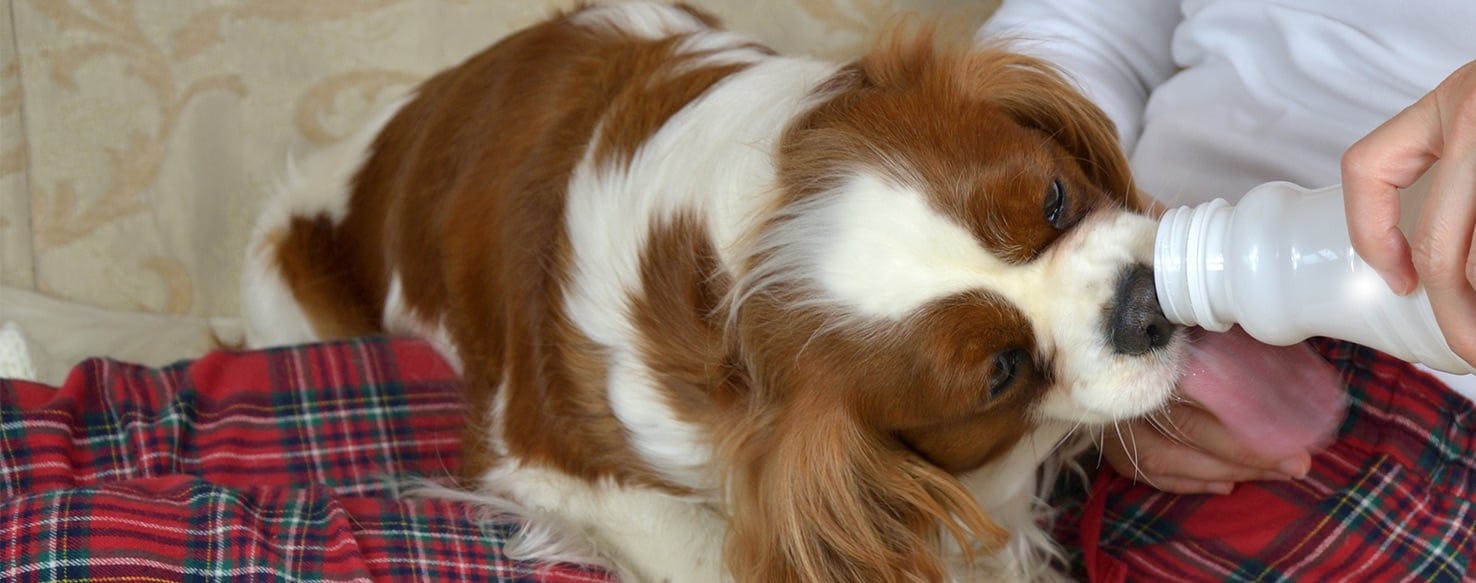- Home
- The Daily Wag!
- Behavior
- Why Do Dogs Like Yogurt

Common
Normal
Yogurt is cool, creamy, and full of good fats and protein. Just like people, dogs love yogurt because it tastes good. Dogs also want to eat what their master is eating so if yogurt is your go-to snack, chances are your pet will want in on that action. Yogurt can be a wonderful treat, snack, or dietary supplement for your dog. You can use it to reward him and as part of your training program. There are some types of yogurt to avoid and medical issues to be aware of as well. Your veterinarian can help you decide if yogurt is right for your dog and your trainer can give you tips on incorporating into your training program.
Yogurt is high in calcium and protein, both of which are beneficial to your dog’s growth, bones, muscle recovery, and coat. Yogurt also contains probiotics that are beneficial bacteria that can aid in digestion, improve immunity, and heal his gut. If he is suffering from intestinal problems, a small amount of yogurt every day could help him heal and aid in his digestion. Make sure to choose one with live active cultures. Yogurt is also a great protein source for those pets that may be allergic to other forms of protein like meat, chicken, fish, nuts, or legumes. You can find yogurt in many forms and flavors, so it is important to read the labels carefully before giving it to your dog. Only offer your dog yogurt that is free of artificial colors, flavors, and preservatives. Dogs do not need the added sugars and it is difficult for them to process chemicals. It is especially important to avoid yogurts that have chocolate, as it is poisonous to dogs. Xylitol is commonly used to sweeten yogurt and it is reported to be 100 times more toxic than chocolate. It can lead to seizures, drops in blood pressure, and even death. Sucralose, stevia, and aspartame are also dangerous for your dog and should be avoided. Dogs always need to watch their calories and fat, so check your labels and buy low or fat-free yogurt. Excess fat and calories can lead to many health problems including pancreatitis and weight gain. Yogurt contains the carbohydrate lactose, which can be difficult for some dogs to digest. It is important to monitor your pup’s reaction to eating yogurt as it could cause him constipation and stomach discomfort. Signs of lactose intolerance also include diarrhea, vomiting, and gas. Start slowly and note changes in your dog’s behavior. Greek yogurt, which is strained of extra whey liquid and lactose, can be an option. It has double the protein, and half the salt and sugar as well making it an ideal snack. Some dogs have an allergy to the protein in dairy with symptoms including vomiting, straining to have a bowel movement or diarrhea. Speak with your vet about your pet’s diet, and let the vet know if yogurt seems to cause problems.
Need advice about your pet's health?
Get answers fast from a veterinary professional 24/7 in the Wag! App.
Get Vet ChatBecause yogurt could trigger lactose intolerance or allergies, speak with your veterinarian prior to trying it out on your dog. Yogurt should be an additive or supplement, not a large source of your dog’s daily caloric intake. One to two teaspoons a day is a fair amount to reap the benefits while not letting it overtake his diet. Once you have reviewed yogurt products on the market and chosen one that is plain, low or non-fat, high in live active cultures and protein, you can see if your pup may like the creamy treat. You can start small by adding a small scoop to his food. It is a great way to moisten his food and keep him full longer. You could also just add a spoonful on top to see if he likes the taste straight. Pet owners also use yogurt in recipes for dog treats and homemade dog food. If you want to make a fun frozen treat, you can scoop yogurt into an ice tray and give him a cube to suck on during a hot day. Yogurt tastes great with fresh fruit, peanut butter, and veggies too. Feel free to add some to create an even healthier and tastier treat for your dog. Do not add chocolate, avocados, grapes, raisins, macadamia nuts, onions, coffee, yeast rolls, dough, or alcohol, as they are all toxic.
When weaning from their mothers, puppies have sensitive digestive systems. Puppies should remain on a special juvenile diet for as long as possible. You can slowly introduce yogurt in small quantities to ensure it does not cause him any distress. If you see a problem, talk to your veterinarian immediately. In training your dog, it is always helpful to find and use a high-reward treat. This is a treat that he does not get often and has to work very hard to get. By keeping yogurt to a minimum you can ensure that when you bring it out, your dog will be more inclined to obey your commands. If you get the go ahead from your vet, you can use yogurt as a high-reward treat. You can discuss ways in which to incorporate yogurt into your training with a professional dog trainer as well.
A yogurt is a healthy option for your dog if you wish to use it in training or to supplement his diet. Discuss your intentions with your vet to assess whether your dog may suffer from lactose intolerance or allergies that can be exacerbated by eating yogurt. Look for plain low or non-fat yogurt without any added flavors or sweeteners. If your dog enjoys yogurt, use it as a high-reward treat in training or an additive to his diet.
Written by a Shiba Inu lover Patty Oelze
Veterinary reviewed by:
Published: 02/08/2018, edited: 01/30/2020
More articles by Patty Oelze
